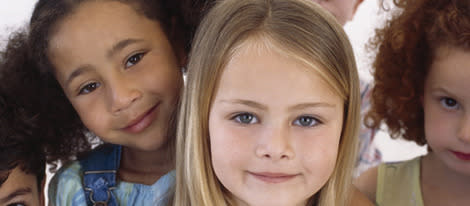How Much Does Peer Pressure Really Affect Our Kids?

Grown-ups cave to peer pressure -- this we know. One of the first social psychology experiments to demonstrate this was the 1950s "Asch" test, in which subjects were asked to judge the length of simple lines on paper. Many gave wildly wrong answers to conform to the pack. Since then, decades of research have shown how adults (even those who fancy themselves independent thinkers) can be swayed by majority opinion.
But how early in life does social pressure take hold? Researchers at the Max Planck Institutes for Evolutionary Anthropology are asking this question, trying to figure out exactly when and how conformity pops up in children. The answer tells us a lot about how even the smallest kids take cues from their peers.
In a 2011 study in the journal Child Development, scientists found that four-year-olds change their answers in groups. To test this, they gave kids double-sided animal picture books. On the left-hand side was a picture of a mom, a dad, and a child; on the right side was a picture of just one family member. Three kids had identical books, while one child's right-hand animal was different (unbeknownst to him). When asked to identify the single animal, the odd-man-out often changed his answer to match the other kids, despite knowing better. Kids only gave blatantly wrong public answers, though. On a separate test, when answers were private, most did not conform -- they gave the wrong response only when it had to be said out loud.
Related: The scientific reason why some kids are popular
If preschool seems young to be following the crowd, last year the same lab showed that even two-year-olds are influenced by majority peer behavior. Little toddlers were found to mimic certain actions when they saw multiple peers doing them, but not when they saw just one peer doing the action multiple times.
We tend to think of peer pressure as a bad thing, but researchers say it's a natural, built-in tendency; it's an adaptive social-learning tactic, especially when you're just getting started in life. "If you know nothing, following the majority isn't a bad strategy," they say. In fact, humans aren't the only ones who do this. The scientists did the same experiments with chimpanzees and found them to mimic the majority, just like the toddlers.
On our home front, I can see that my little primate is swayed by his four-year-old buddies at times. He'll call an activity "boring" that he usually loves, and my husband swears that his goodbye kiss is brief because a judge-y classmate teased him at drop-off. It's subtle, but the peer pressure is there.
Because adults, teens, preschoolers, toddlers, and chimps all do it, it's probably best not to think of social conformity as a negative, or something to fix. No matter what we do, it will exist, and perhaps for good reason. Instead, notice when your little one is influenced by friends and make it an entry point for discussion. In my case:
Hmm, that's interesting. I've seen you enjoying tag on the schoolyard, but today you're saying it seems "boring." (I'll let my husband handle the goodbye-smooch dilemma).
Especially helpful is to use yourself as an example: Have a chat about a time when, as a kid, you and the crowd had different ideas, what that was like, and how you handled it. It's good to have these conversations now, so that a decade down the road (when the peer-pressure stakes are not playground games, but drinking and smoking), the foundation is already there. The best we can do is talk to our kids about holding on to their thoughts and feelings, while respecting the importance of the group and the big role it plays in their development. As parents, we tend to emphasize and value individuality, but remember that humans are social creatures -- and our kids are no exception.
- By Heather Turgeon
Follow Heather on Babble
For 12 things your kid MUST see you do, visit Babble!
MORE ON BABBLE
10 ways to bully-proof your kid
7 things you should NEVER say to a kid
11 mistakes all parents make (even the perfect ones!)
25 things every kid should experience

